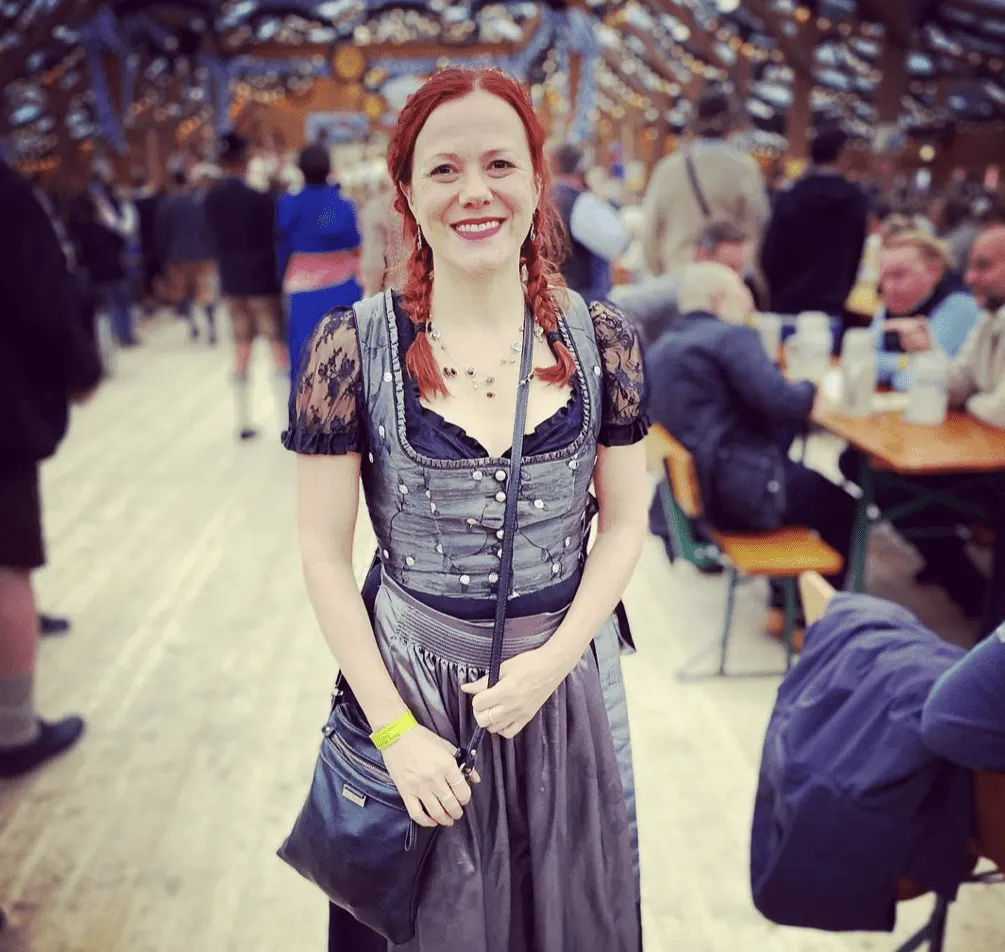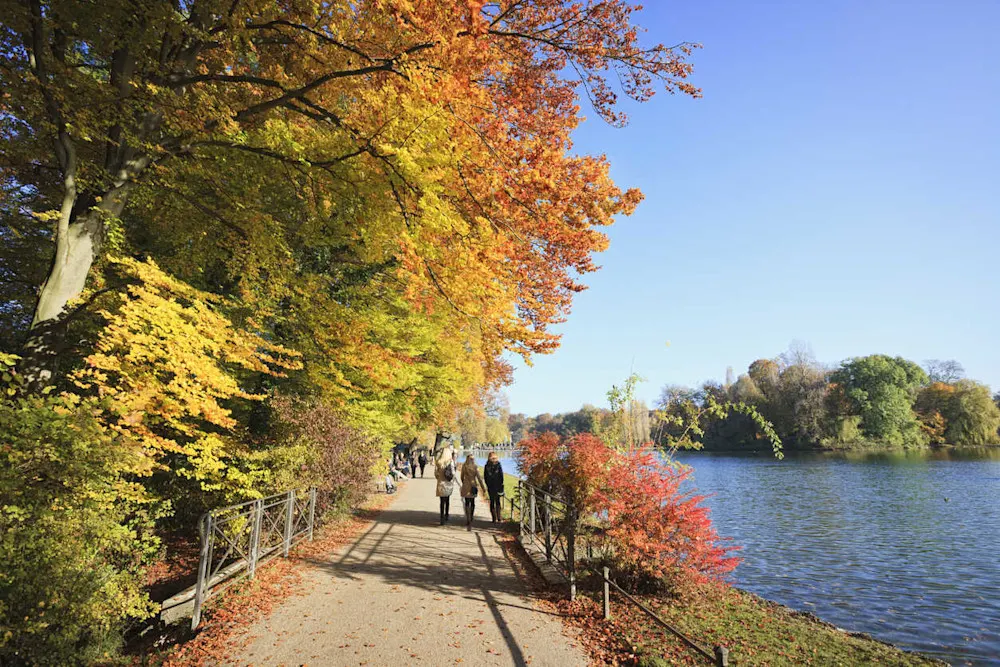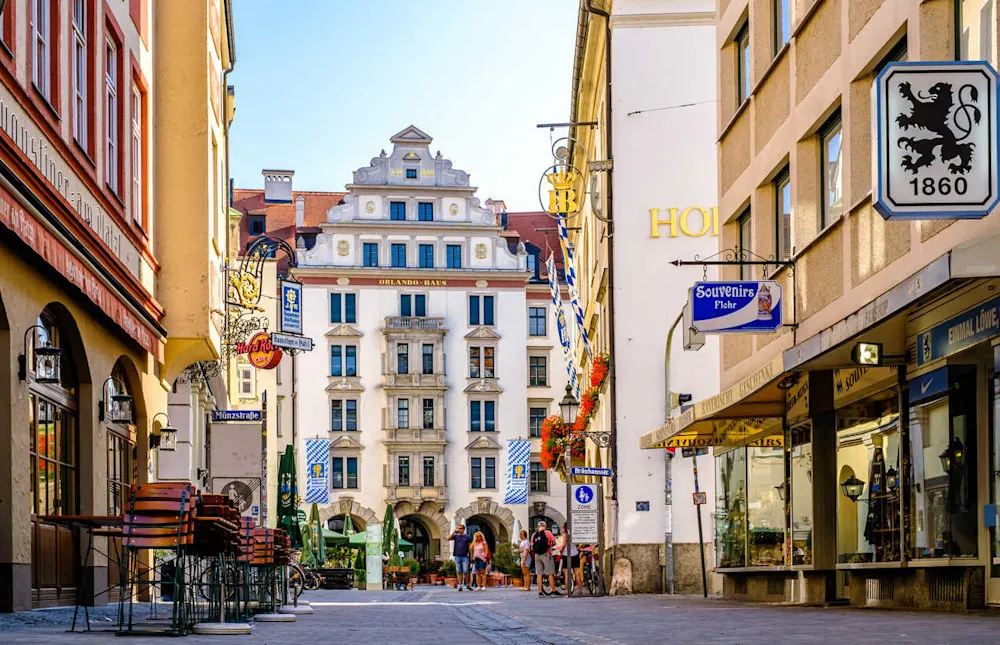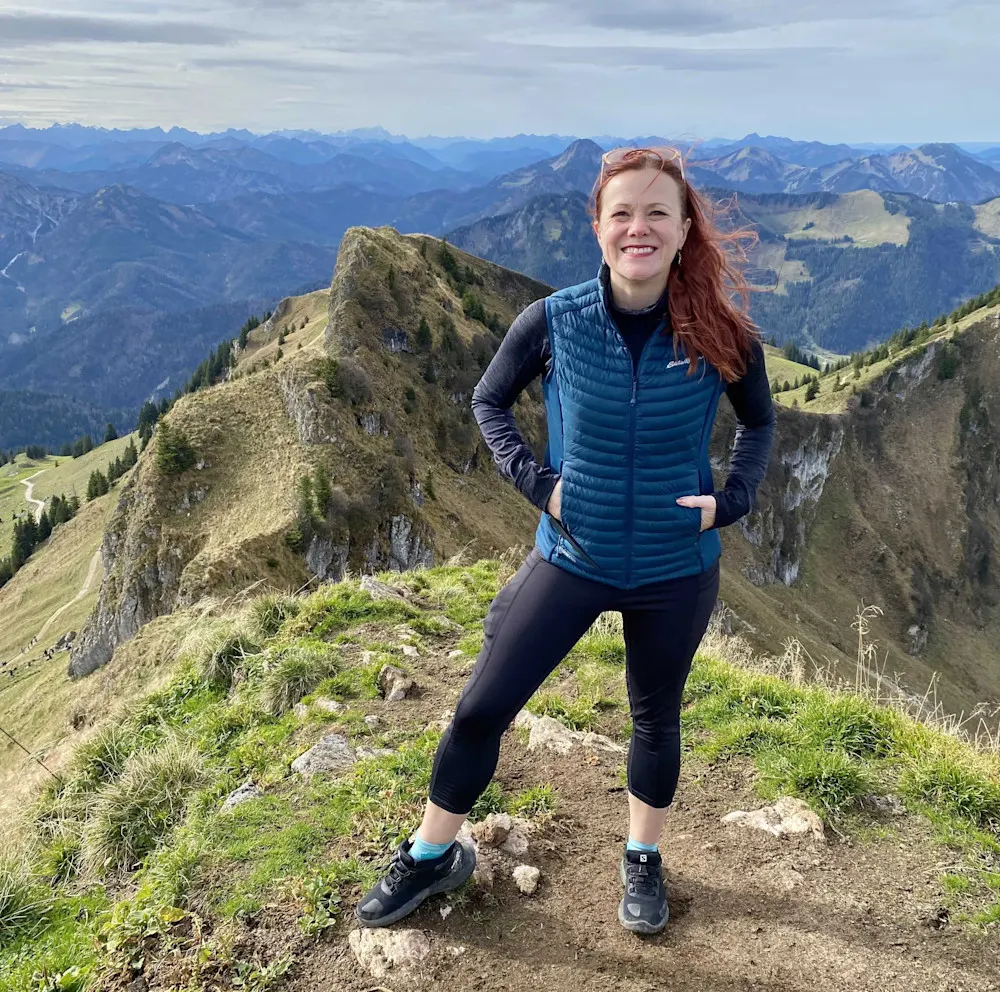If you had looked into a crystal ball twenty years ago and told me I would end up in Munich, Germany, riding my bike for transportation, hiking up to scenic Alpine peaks for a beer at the top, I probably would have laughed and asked for my money back.
Beijing is an intensely urban, sensory overload of a capital city that was my entire life for six years. Like many foreigners there during the time of the 2008 Olympics and after the Global Financial Crisis, I worked hard and played hard as an expat travel writer and a reporter for the Chinese Radio covering local events, never missing a chance to network, go out to eat, celebrate a birthday, attend opening events at new clubs, or a party at the Great Wall of China.
Fast forward... and here I am — hiking on the weekends, embracing the idea of “winter wellness” in a scorching 90 °C sauna, sweating with 30 strangers, then jumping in the icy lake, enjoying full-day picnics by the river. And loving it.
When I traded Beijing’s unpredictable chaos for Bavaria’s peaceful nature, I discovered a lifestyle I didn’t even know I craved, one built around biking, beer, and Alpine hikes. Here’s how life in Munich turned out to be the safe, peaceful, grounding European base I never knew I needed.
The World’s Best Retirement Havens for 2026
The World’s Best Retirement Havens for 2026
24 Countries Compared, Contrasted, Ranked, and Rated. You don’t have to be rich to enjoy a pampered retirement, you just need to know where to go. With our 35th Annual Global Retirement Index, our experts hand you a detailed roadmap. Details—and a Special Offer—Here

By submitting your email address, you will receive a free subscription to IL Postcards, The Untourist Daily and special offers from International Living and our affiliates. You can unsubscribe at any time, and we encourage you to read more about our Privacy Policy.
From Minnesota to Munich

I’m originally from the “Land of 10,000 Lakes,” a.k.a. Minnesota, U.S. My first time leaving the country alone was after graduation in the late ’90s. It was the standard poorly planned Euro backpacking adventure of trains and Eurail passes, dingy hostels, and arrivals to new countries in the middle of the night without reservations, local currency, or even food. In short, a lifelong lesson of “How NOT to Backpack Europe — 1996 Guide,” but it gave me a revitalizing spark of life after a deflating high school experience where my family fell apart and I went from being a good student who studied Chinese, played oboe, and excelled in ballet and soccer, to working as a waitress and barely finishing high school.
Apparently, Bob Dylan once said, “I didn’t know what I was looking for, but I knew I wouldn’t find it in Minnesota.” That was me. Traveling around Europe was fresh and inspiring, igniting a much-needed curiosity and determination to go see more. When I saw an ad called “Leap Now” in my Berkeley Guide to Europe, I signed up for Spanish study abroad in San Miguel de Allende, Mexico, volunteer work in London, and Chinese study abroad in Beijing. That plan became the foundation for my new life.
I worked two jobs to save up $15,000 in 1998 to leave the U.S. at 20 years old, terrified — and yet, that plan changed my life in the best way possible. What I didn’t know, however, is that relationships change plans. So, I volunteered in London, then moved back to Mexico for the first partner, and when we broke up, I got my plan back on track by moving to China in 2006 in a moment of heartbreak and panicked escapism. Later on, I moved with my second serious partner to Munich in 2012 for my master’s program and a new life. And even though the relationship didn’t work out, Germany ended up being just what I needed.
How I Made the Move
My ex got a job in Munich, and so we decided to move together from Beijing. Since studying is one of the easiest ways to move to Germany long-term, and I had been wanting to get my master’s degree in media communications at some point, it also made sense.
Many of the foreign professionals here in Munich work in STEM (science, tech, engineering, mathematics), since you can easily get a well-paying job from abroad even without speaking German. Plus, Bavaria has top industry giants of all kinds based here, such as BMW, Siemens, Allianz, GSK, Audi, Microsoft, Google, and ProSiebenSat.1.
Unlike Spain or Portugal, Germany doesn’t have a digital nomad visa per se; there is a freelancer visa, but due to the registration process, tax office, and red tape (I set up my EFT Empowerment coaching business during lockdown), it’s quite difficult if you’re not fluent in German and able to navigate bureaucracy.
However, Germany currently faces a shortage of skilled workers and has introduced new initiatives, such as the “Job Search Opportunity Card,” which provides a one-year visa while you search for work. If you’re from outside the EU, studying is still one of the easiest options since, after graduating, you get an 18-month work visa to find a suitable position. Once you’re hired, your visa is tied to the company you work for and can be extended with your work contract. In addition, after five to seven years, you can apply for the German passport or for permanent residency like I did, which gives you most of the rights Germans have except voting.
I chose a degree in Media Communications at Macromedia Hochschule (in English) and my arrival to Munich started in September 2012 with Oktoberfest literally across from my university at Theresienwiese. Since we didn’t have a flat in Munich upon arrival, we stayed in my ex’s family’s apartment in Erding, a village suburb of roughly 30,000 people where everything was closed on Sundays and after 6 p.m. The countryside was a breath of fresh air, literally, except it was the quietest, loneliest phase of my entire life.
Erding was a tough starting point as it took over an hour to get into town and home at night with the S-Bahn. It wasn’t until we moved into Munich proper that I could really experience it.

It was a bumpy landing, but the more I went to Meetup.de networking and happy hour groups, took German, guitar, yoga, and salsa classes, I met people. Through those people, I met other people at barbecues, birthday parties, and more. It’s taken time, but I can now say I have an amazing group of friends that are like my family. It takes more effort to make friends here, but if you’re willing to get outside your comfort zone, it’s worth it.
One big factor in connecting? Studying the language. Learning some German makes a huge difference in daily life. Many Münchener locals speak English well, but you’ll still run into hurdles at the visa office, tax office, or even when ordering at a bakery or restaurant. I always tell new arrivals to aim for at least an A2 level before they come (and skip the Duolingo shortcut!). Bavarians really appreciate the effort, and you’ll get friendlier treatment when you try. Weekly language classes have helped me keep my German at a solid B1/B2 level. Meetups are also helpful; plus, they’re a great way to meet people.
The World’s Best Retirement Havens for 2026
The World’s Best Retirement Havens for 2026
24 Countries Compared, Contrasted, Ranked, and Rated. You don’t have to be rich to enjoy a pampered retirement, you just need to know where to go. With our 35th Annual Global Retirement Index, our experts hand you a detailed roadmap. Details—and a Special Offer—Here

By submitting your email address, you will receive a free subscription to IL Postcards, The Untourist Daily and special offers from International Living and our affiliates. You can unsubscribe at any time, and we encourage you to read more about our Privacy Policy.
Munich’s Historic Charm

Munich is a city where they love beer, tradition, and enjoying nature. One of the first things you’ll notice is that it’s impeccably clean with bike trails everywhere. The Isar River runs through the city and the beautiful, sprawling English Garden.
Munich’s Old Town dates to the 1100s and is famous for Marienplatz, known for its neo-Gothic Rathaus government building that looks more like a cathedral surrounded by fancy cafes and elegantly dressed people sitting outside drinking Aperol spritz after shopping in nearby Maximilianstraße (think: Rodeo Drive of Munich). Munich’s center has stretches of charming buildings with painted façades, little alleyways, and the iconic Frauenkirche church with its two bulbous green towers.
Nearby, one of my favorite places is the bustling Viktualienmarkt with over 140 food stalls with fruits and veggies, honey, Turkish stands with delicious olives, old butcheries with bratwurst, and breweries like Giesinger Bräu, Hacker-Pschorr, and Hofbräu.
This Altstadt is sometimes known for its “schicki-micki” vibes, meaning fancy in a German “bling” kind of way. However, if you take the tram or bike to the river a few minutes away, people are extremely casual, sitting drinking beer, eating sandwiches on the ground, listening to techno on portable speakers. Culturally, Munich people consider themselves Bavarian first for their Catholic faith, trachten (dirndl and lederhosen outfits), beer, hearty cuisine, and traditional values.
Some people have the impression that Germans are reserved, and yet, as an American, it took some getting used to how surprisingly comfortable they are both with nudity in the park and in the saunas (which are mixed, and swimsuits aren’t allowed) — and no one cares. Or stares.
I find people here friendly if you meet them at the beer gardens or at the Alpine huts in the mountains. An enthusiastic “Prost!” with your beer really goes a long way. Plus, it’s very international with around 30% foreigners from all over the world studying at TUM and LMU, and working in Munich’s academic, tech, automotive, pharmaceutical, and scientific industries.
Living Affordably in an Expensive City
It’s no secret that Munich is one of Germany’s richest and, therefore, most expensive cities. This is especially true when it comes to housing, where only 25% of people own their apartment or house here. Moreover, there is a shortage of affordable rentals, so even 30 sqm studio apartments can start at €800 to €1,000 a month, so it’s not uncommon to live in a shared flat if you’re single and pay €500 to €800 instead. Finding a flat takes time, so make sure if you’re moving here that you have enough set aside for six to eight weeks at a hotel or Airbnb while you look, plus enough for deposit and rent. Also, oddly, many Germans either take their kitchens with them when they move out, or you can offer to buy it.
In restaurants, the quality-to-price ratio for food is pretty decent. You can still get a generous Bavarian meal like roasted pork or chicken, Italian pizza or pasta, or an Indian or Turkish meal with a drink for €20–30. Of course, street food like döner kebab or a bratwurst starts around €4–8. I find grocery store prices in Germany to be extremely reasonable compared to other countries. I was shocked at how cheap Aldi is, with even organic milk costing €1.25, 500 g of marinated boneless chicken thighs for €4.99, six free-range eggs for €2.39, and a bag of baby spinach for €1.79.
Munich doesn’t have to be expensive, especially if you learn to love cooking. Also, you’ll find people here love being outside and cut costs by combining green spaces with food and drinks. For example, it’s completely normal to buy a Wegbier, meaning a “beer for the way”, at the kiosk and walk around, sit on a bench in a plaza, in a park, or by the river. Or you can hang out in one of Munich’s nearly 200 beer gardens, where you’re allowed to bring your own brotzeit of bread, cheese, and cold cuts as long as you buy the big liter Maß beers from them.
Bavarian Alps Just an Hour Away

Honestly, though, I didn’t fully appreciate Bavaria until one Saturday hike with a German friend. Up until that point, I had barely ventured outside the city center, and the only people I knew who hiked woke up at 4 a.m. on a Saturday (no thanks!). Instead, we took the train to Garmisch 1.25 hours away, hiked through pastures with mountain cows grazing and wearing bells — like in those postcards of Switzerland! We reached the top and were rewarded with a breathtaking view, beers, and homemade bread with ham and cheese slices. I was hooked.
Since then, I’ve joined “Munich Hiking Buddies” and lead hikes on the weekends, so my gratitude for Bavaria’s nature has flourished, along with my knowledge of the region’s incredible hiking trails. The best part is that you don’t even need a car, so many places are accessible on the train lines, and you can be back by dinnertime. It’s easy to understand why Bavarians are so proud of this area. Plus, they’re honestly the fittest people I’ve ever seen, and I’m convinced this is the reason for their logic-defying metabolism since they seem to drink so much beer and eat bread at every meal with butter, ham, cheese, and sausages.
Healthcare and Insurance in Germany
Many Americans ask me how I like German healthcare, and my answer is: it’s not cheap, but everything is covered. So, I never worry about going bankrupt from medical bills, and honestly, I don’t know if I could ever adjust to the U.S. model again. Here, there are no deductibles, no co-pays, no unexpected huge costs, and wait times are minimal. Germany has a multi-payer system with both public and private health insurance. To be insured, you pay a percentage of your income based on your marital status, children, etc. It’s a complex system of state and federal government, self-government bodies, healthcare providers, and public and private insurance companies that regulate prices and care.
One time, I had a bike accident on my way to work. The knee brace (€1,000), monthly x-rays, and physio for eight months were all covered. A few months ago, I got bronchitis and made an appointment with the Doctolib app Sunday night. I went to the doctor by 10:00 a.m. and picked up my €5 prescribed antibiotics at the pharmacy by noon on Monday.
I know two people who had cancer several times, needed radiation or surgery, and repeated hospital stays, and it was all covered by insurance. Whereas, in the U.S., one friend of mine needed to have a GoFundMe and a bake sale to raise money for her third round of chemo.
Leaving Munich? Nah.
All this is to say that for me, Munich is home for now. I built my life here, have an amazing group of friends from all over the world, and love my coaching business and healthy life. Munich gave me something I didn’t know I was searching for: space to breathe, heal, enjoy the outdoors, and a quality of life, as Henry David Thoreau puts it: a way to live my life “more deliberately.”
The World’s Best Retirement Havens for 2026
The World’s Best Retirement Havens for 2026
24 Countries Compared, Contrasted, Ranked, and Rated. You don’t have to be rich to enjoy a pampered retirement, you just need to know where to go. With our 35th Annual Global Retirement Index, our experts hand you a detailed roadmap. Details—and a Special Offer—Here

By submitting your email address, you will receive a free subscription to IL Postcards, The Untourist Daily and special offers from International Living and our affiliates. You can unsubscribe at any time, and we encourage you to read more about our Privacy Policy.
